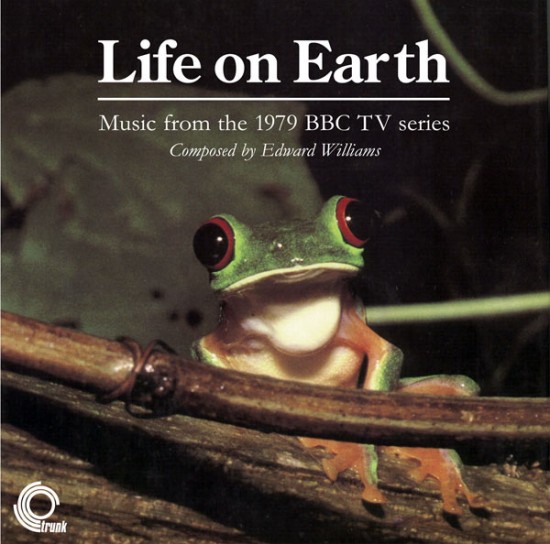The music to the 1979 BBC TV series, by Edward Williams, is released today on Trunk Records. Here, Nick Franglen tells of how these seemingly lost recordings were unearthed and what a pleasure they are to listen to:
We used to love Life On Earth in our house, so much so that for years afterwards my mum would suggest, somewhat to my teenage irritation, that I should become a marine biologist rather than a rock god, thereby proving that mothers know more about you than you might think – it’s an amateur activity I’ve taken up only recently. From the tiniest wobbling micro-organisms to that famous footage of a whispering David Attenborough being groomed by silverback gorillas in Rwanda, it made captivating and sometimes life-changing viewing for a global audience of 500 million people, so it’s all the more surprising that the music for the 1979 series has never before been released. Once again we have Jonny Trunk and his remarkable tenacity to thank for tracking it down and making this lost gem available for the rest of us to enjoy.
The story of its renaissance is an interesting one. Jonny first caught wind of the existence of a record of the Life On Earth music from a friend who had found it, with no label name and little information, in a charity shop in Ealing. Despite extensive rootling around Jonny could discover nothing more about it, made all the more intriguing when he saw it mentioned on an obscure vinyl website which aligned it with his own Trunk releases by Basil Kirchin and John Cameron. He finally got his hands on his own copy found hidden in an unexpected windfall purchase of 500 library albums, and on hearing it set about trying to release the record himself.
Jonny succeeded in tracking down Life On Earth’s composer, Edward Williams, who was at last able to explain the provenance of this elusive record: Williams had privately pressed about 100 copies of the music for any members of the orchestra who had played on the recordings and wanted one. Williams himself had a long and fascinating career of composition and invention, with many years of writing for Oscar winning documentaries and other films paralleled by a growing interest in electronic music and multi-media performance. This would find him in the 70’s touring with his VCS3 band “Uncle Jambo’s Pendular Vibrations”, and I was surprised and impressed to see that he had invented the Soundbeam, the contact-less instrument played by body movements which to this day remains an invaluable tool for music therapy.
Jonny eventually licensed the album from the BBC, and got permission to use the iconic tree frog photo for the artwork personally in a phone call from David Attenborough, who also said he thought that Williams’ music was “jolly good”.
He’s right of course. What a pleasure it has been to listen to this record. I thought I wouldn’t remember any of it but the moment the album started up with the swelling title track – “Life On Earth Begins In The Sun’s Energy” – I was back there, agog with the excitement of the natural world.
This is soundtrack music of the most evocative kind. These are swamps, deserts, and coral reefs containing creatures great and small engaged in weird dances, courtship, hunting, death. Written mainly for a small chamber orchestra in post-war classical styles but also incorporating invigorating and beautiful electronics and the imaginative use of effects, each track covers several different scenes from an episode in the most enchanting way. The third track is almost a microcosm of what is to be found throughout the album as a whole, covering a variety of musical styles without ever undermining any sense of the flow. With its snappy title, “Comb Jellies – Hydromedusae – “Birth” Of A Medusa – Gymnopodie For Jellyfish”, the track starts with a solo viola playing beautiful, ghostly Messiaen-like passages through long reverby delays with a building accompaniment of electronic bells, developing gently with oboe and other instruments to morph into a delicate Satie-referencing Gymnopodie played by flute and harp. It’s a lovely journey, and you can really sense what the creatures are doing as they float by. The same applies to so many of these tracks, the names for which alone would be worth the price of entry: Slow Dance For Nudibranches, The Spiny Leaf Insect Sheds Its Skin, Mating Dance For Prairie Garter Snakes, The Serval Pounces. I found a good drinking game with friends by putting playback on random and trying to match the track with its title.
Some of the more electronic pieces sound as though they could have been written yesterday, none more so than the album closer, “Man – A Choice For The Future Of Life On Earth?”, with its appropriate question mark. It comes as a shock to hear Attenborough’s voice for the first and only time on the album, his closing speech from the TV series appearing as disjointed samples through a primordial soup of dense synth washes and an Yma Sumac style sweeping vocal – “… we may have given the impression that somehow man was the ultimate triumph of evolution… There is no scientific evidence whatsoever for such a belief… The fact remains that man has an unprecedented control over the world and everything in it, and so, whether he likes it or not, what happens next is very largely up to him.” Cue closing credit titles and contemplation.
It’s a lovely album, a bit odd in places, warm and pastoral in others, and a real pleasure to be treasured 30 years after it was first created. That’s a bunch of my Christmas presents sorted, and with a built in drinking game too – what could be better?
Buy the record from the Trunk store HERE.
Edward Williams biography HERE.
Nick Franglen is a record producer and one half of the group Lemon Jelly.
